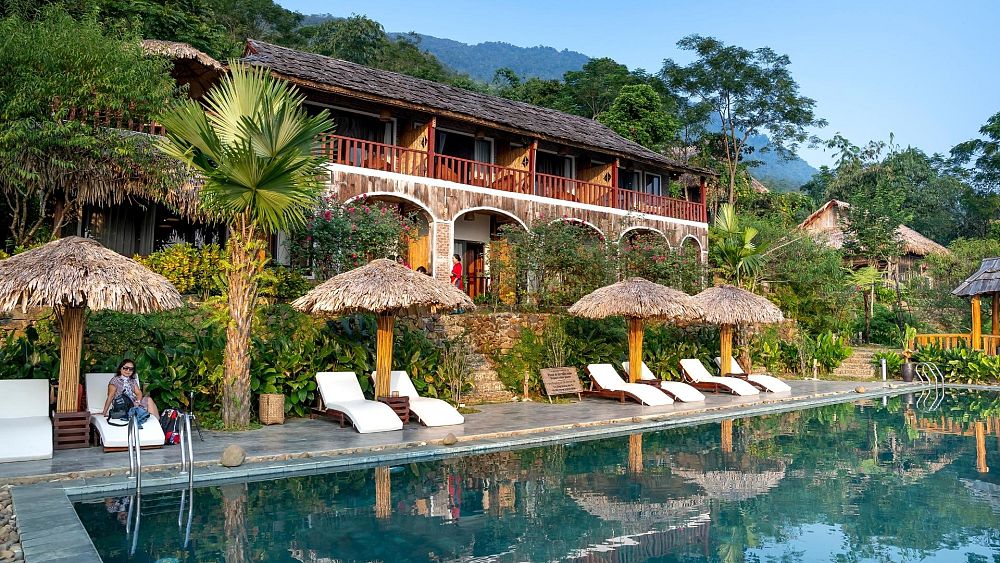Can corporate hotels survive the green travel revolution?
Choosing where to stay on vacation is one of the most exciting and stressful parts of your trip.
While some of us are content with cleanliness and a good location, others need room service and a balcony with a sea view.
But with sustainable and conscious travel becoming more mainstream, we may soon be faced with different choices when booking our accommodation.
How to book a sustainable vacation
If you want to travel more sustainably, many booking sites now allow you to research green options. Skyscanner can help you find flights with less CO2 emissions, while Booking.com launched its Travel Sustainable badge last year. This new initiative allows users to choose hosting deemed eco-responsible by more than 30 third-party organizations.
Being a conscious traveler is about more than protecting the environment. It also means considering the people who live in the places you visit.
A quick search on Booking.com for accommodation in Manhattan shows that most major hotels have the Travel Sustainable badge. While they may use eco-friendly products and ask you to use your towel more than once, that doesn’t make them the most conscious choice.
Staying in a boutique hotel or locally owned apartment usually ensures that money goes back to the community you are visiting.
Employees are often locals, produce and products are locally sourced, and there is less risk of employee exploitation.
Staying in an apartment also forces you to make greener choices. You need to buy your food locally, and if you choose independent grocery stores, you’ll be supporting individuals, not big corporations, and you’ll feel more connected with the **surrounding** community.
The problem with Airbnb
Unfortunately, this tactic also has its limitations. Companies like Airbnb have contributed to the housing crisis in many cities over the past decade. The properties are not always owned by locals, which means the money generated is often sent out of the country.
Airbnb has also made it more desirable for people to buy multiple properties and rent them out, an extremely common situation in the UK.
A recent report has revealed that first-time buyers in popular tourist areas like Cornwall have been forced to leave their home towns because properties were bought up by investors or as holiday homes.
So while choosing an independent property or hotel might seem like the most conscious choice, it doesn’t always work out that way.
Being a sustainable, conscious traveler is complicated, and you may have to sacrifice one cause to champion another. You can’t always be environmentally friendly and ethical. But it is okay. It’s the intention that counts.
How are major hotel brands reacting to the evolution of travel?
Most hotel chains are not able to switch instantly to a sustainable model. But in a world where the climate crisis is constantly in the news, these brands need to do something to retain customers and adapt to changing consumer needs.
Bryan Oknyansky, senior designer at Dexter Moren Associates, says he has noticed that “many brands are already implementing sustainable measures such as reducing waste in their supply chain and reducing energy consumption through systems management of intelligent buildings”.
Although he acknowledges that “big brands or traditional brands are not as nimble as small brands, they are likely to make the biggest changes due to the breadth of their supply chains and their operations”.
What’s next for holiday accommodation?
Bryan believes that “the next hurdle for brands large and small is to improve the customer experience through the implementation of sustainable initiatives.
“marks [are] launch initiatives to analyze how guests use their hotels to better understand how they can optimize their hotel operations to achieve sustainable goals.”
And when it comes to private rental properties, we’re already seeing some noise about the state of the housing market, but that’s not enough to completely dissuade people from renting private property. Also, not all houses belong to a real estate hoarder.
The power is in our hands
Despite promises from governments and tour operators, tourism trends are mostly driven by the traveller.
It’s a multi-trillion dollar industry and what we say is worth it. If we all start demanding that stations become fully sustainable, then that’s what the big brands will have to deliver.
But if we don’t pay attention to where our money is going or to the local communities that are suffering because of tourism, no one will.
We live in a time when so much is beyond our control. But sustainable, conscious travel is something we can control.
So enjoy your vacation, but remember that the little things you do make a big difference.


Comments are closed.